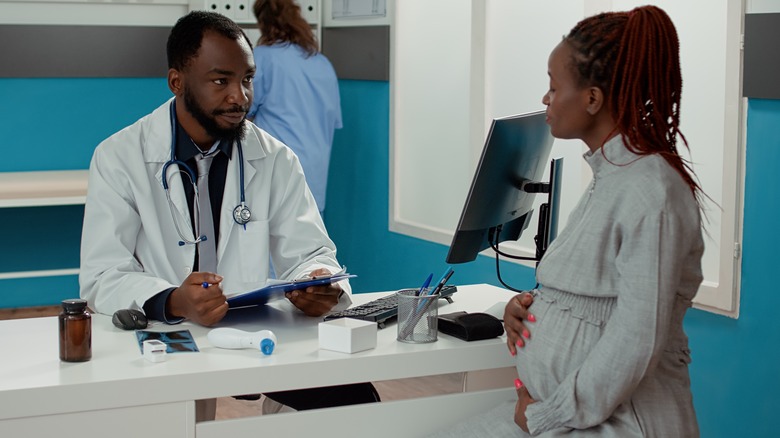Is It Safe To Take Amoxicillin During Pregnancy? Here's What We Know
Used to treat a wide range of bacterial infections, amoxicillin is among the most frequently prescribed medications for affected patients. According to research published in StatPearls, the drug may be used in cases of illness related to staph infection, community-acquired pneumonia, E.coli infection, and more.
Prescribed for both adults and children, there are certain cases in which using amoxicillin isn't recommended. This may include patients with kidney or liver issues, medication allergies, or those who have been recently (or will soon be) vaccinated, reports the National Health Service. It is not uncommon to experience nausea or diarrhea when taking amoxicillin. However, in rare instances, more severe side effects may occur — such as a circular skin rash, anaphylaxis, joint pain, skin discoloration, bloody stool, or liver problems. While the chances for serious outcomes are less than 1 in every 1,000 people, knowing these risks, is it safe for pregnant people to take amoxicillin for a bacterial infection?
Amoxicillin is generally considered safe to take during pregnancy
Classified by the U.S. Food and Drug Administration (FDA) as a pregnancy category B drug, no definitive risk has been found in association with amoxicillin usage during pregnancy (via StatPearls). As a result, it is readily used by pregnant patients. There is no indication that dosage adjustments need to be made. Because minimal amounts of the drug are transferred through breast milk, amoxicillin is also considered safe to use while breastfeeding.
So are there any possible risks of using amoxicillin while pregnant? The evidence is somewhat conflicting. A 2013 study published in the scientific journal Epidemiology found a link between maternal use of amoxicillin during the first trimester of pregnancy and a potential increased risk for oral clefts in infants. The researchers cited that oral cleft prevalence rates stand at approximately one to two cases for every 1,000 live births. While the study findings showed an increased risk of roughly two to four cases per every 1,000 live births, the study team noted this increase is still considered minimal compared to the general baseline risk of major birth malformations — which stands at 30 per every 1,000 live births.
Consult with your physician if you have questions
As previously mentioned, however, the evidence connecting birth malformations with amoxicillin usage during pregnancy is not definitive. Rather, a more recent 2019 study published in the British Journal of Clinical Pharmacology produced an outcome opposite of the 2013 study. The study team analyzed more than 101,000 pregnancies from multiple databases in Israel. Amoxicillin exposure during the first trimester had occurred in 6.8% of pregnancy cases, some of which occurred in combination with clavulanic acid exposure. The study found there was no increased risk of major congenital malformations in relation to amoxicillin exposure during early pregnancy.
Should you have any concerns about taking amoxicillin while pregnant, be sure to speak with your doctor, especially if you take any other drugs or supplements. Your physician can help you decide if taking amoxicillin is a safe treatment option. If prescribed, remember to finish the medication in its entirety. Even if you begin to feel better, doing so ensures that the infection won't become antibiotic-resistant.



